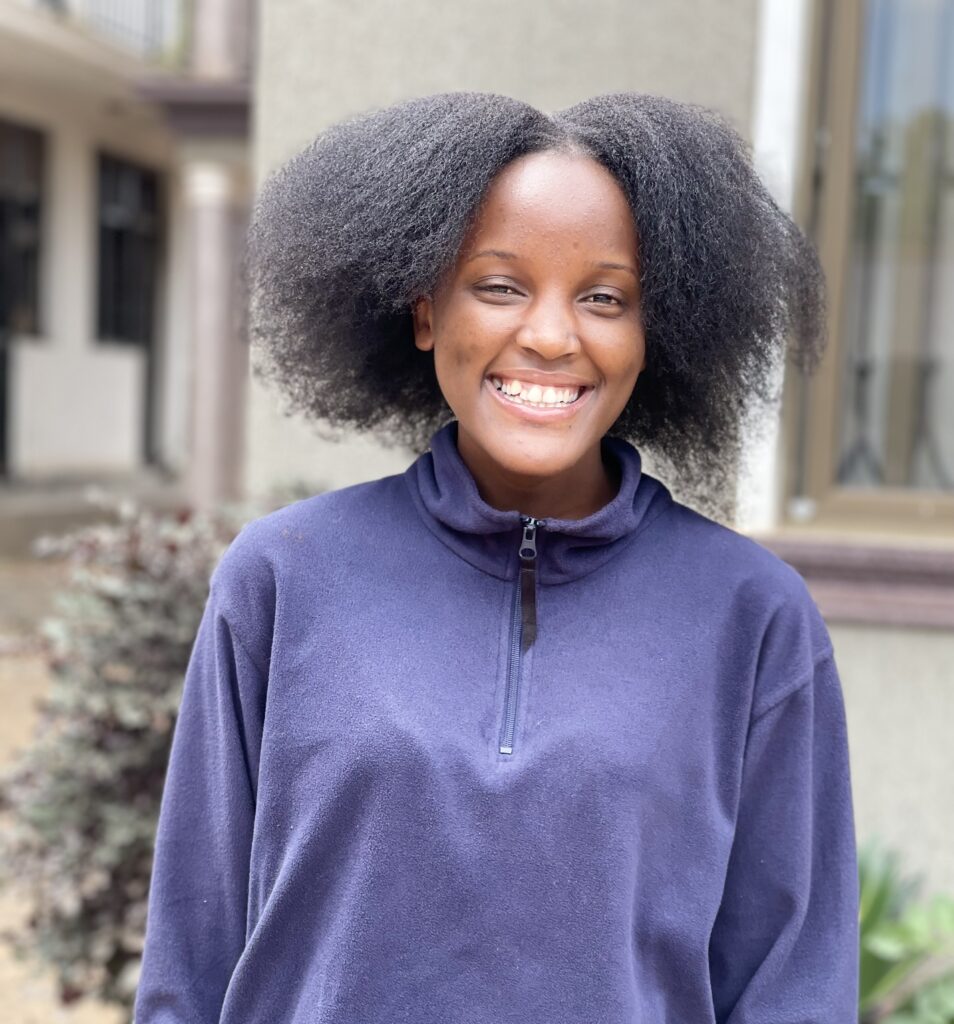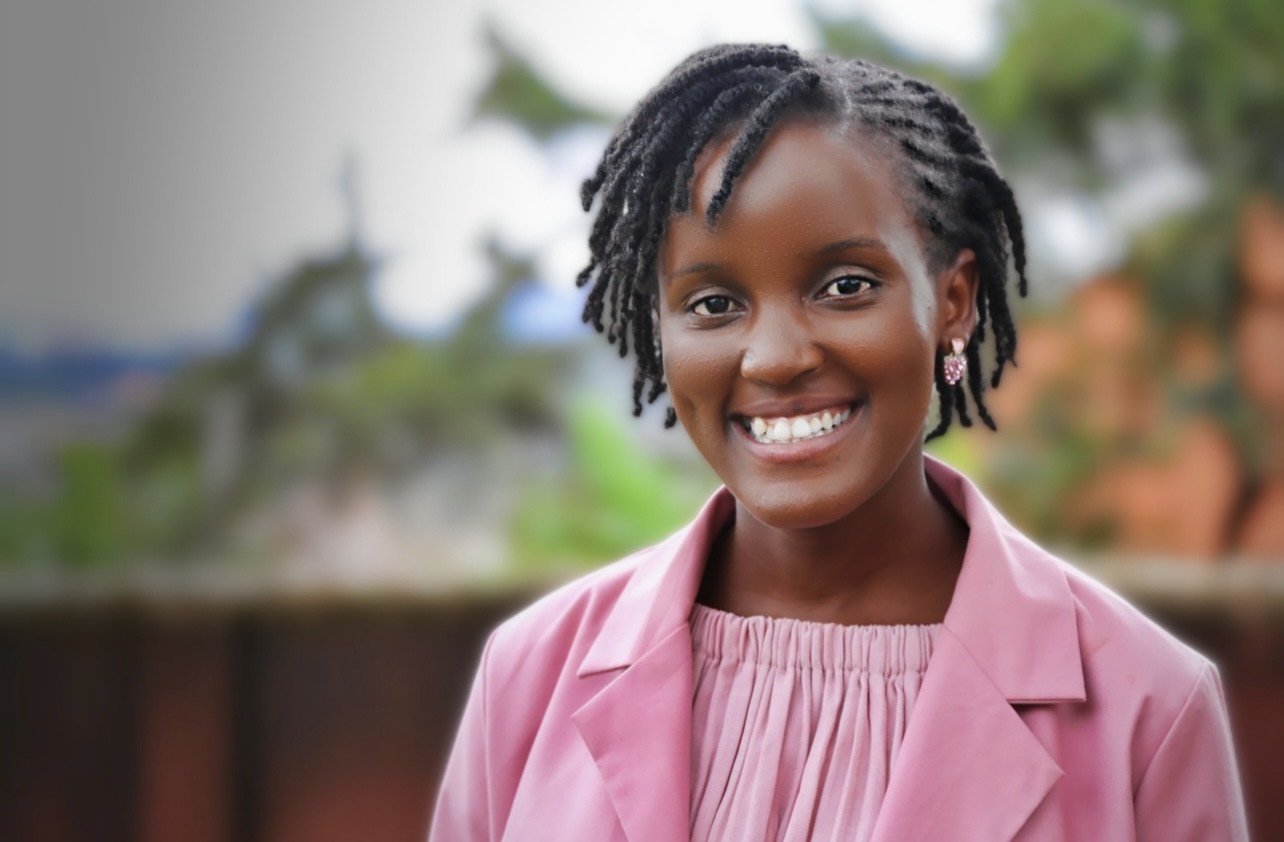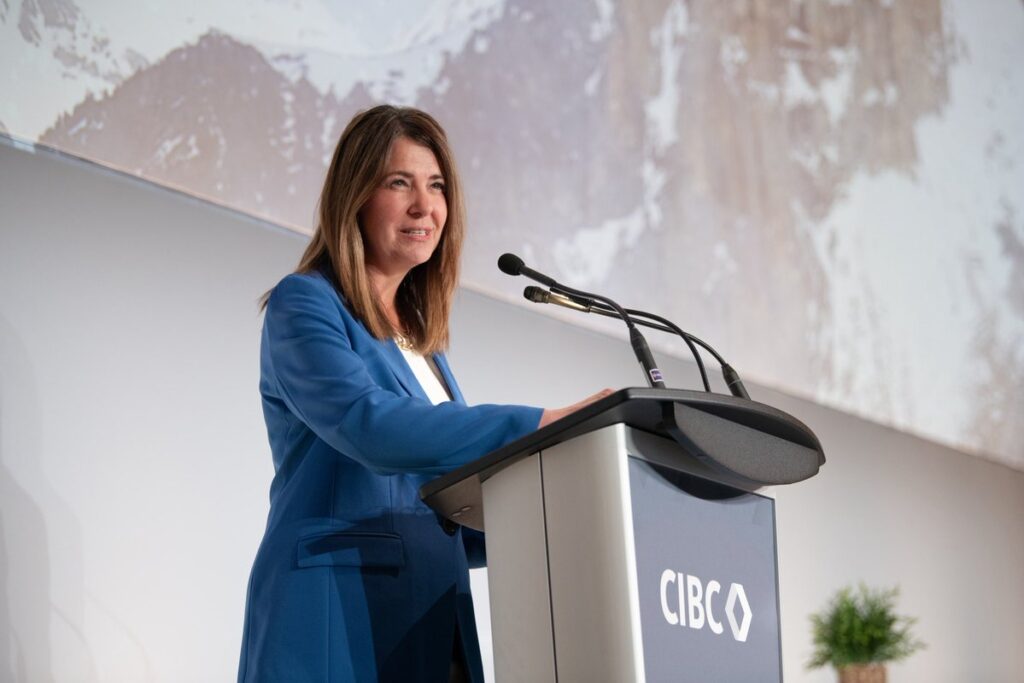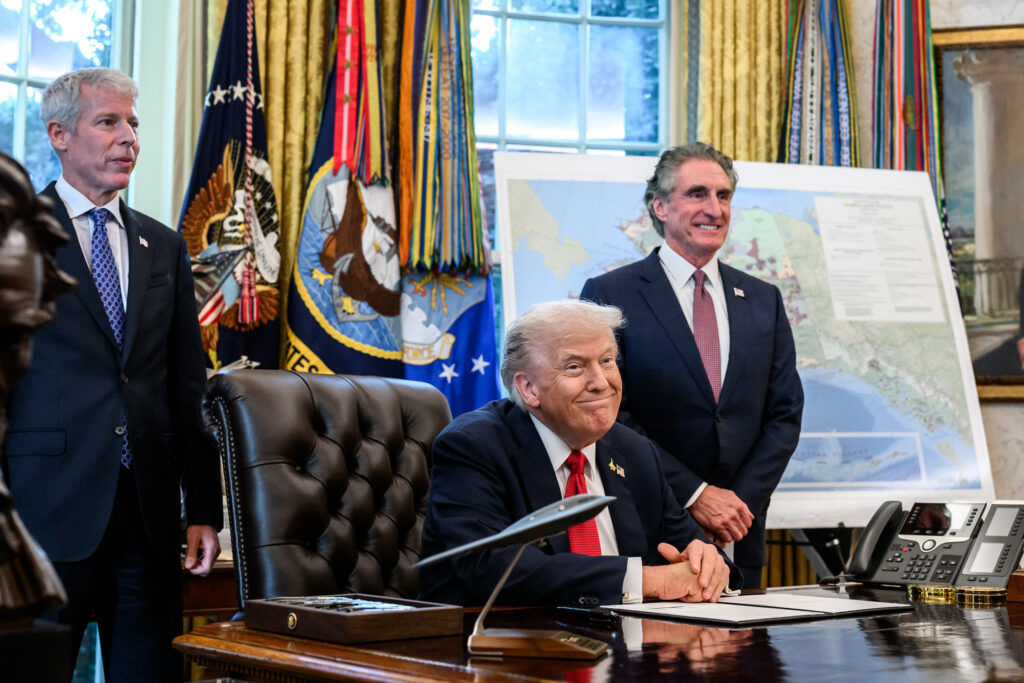Since starting a solitary strike against climate inaction in Kampala in January, 2019, aged 22, Uganda’s Vanessa Nakate has emerged as one of the world’s most celebrated youth climate justice activists. Now a UNICEF Goodwill Ambassador, she will be attending the COP28 U.N. climate talks, which open in the United Arab Emirates today, to demand world leaders act with the ambition the crisis demands.
In January 2020, a media company cropped Nakate out of a photo featuring her friend Swedish activist Greta Thunberg, and three other young white women climate advocates, attending the World Economic Forum in Davos, Switzerland. Nakate’s response that the news outlet “didn’t just erase a photo, you erased a continent” focused global attention on the obstacles preventing climate advocates from marginalised communities participating in international gatherings. Vanessa is the founder of Youth for Future Africa, the Rise Up Movement, and author of A Bigger Picture, a manifesto on inclusive climate action, and featured on the cover of TIME in 2021.
In an interview with the online Climate Consciousness Summit 2023, running in parallel to COP28, Nakate spoke with Kosha Joubert, chief executive of the Pocket Project, a nonprofit organisation dedicating to healing collective and inter-generational trauma, and a co-host of the summit. They discussed Nakate’s journey as a climate activist; the need for greater institutional support for climate advocates from the Global South; the meaning of a “just transition”; the power of forgiveness; and the importance of building systems to sustain young activists over the long-term, and help them to avoid burnout.
The following is a partial transcript of their conversation, lightly edited for clarity. The whole interview can be watched by visiting the Climate Consciousness Summit 2023.
Kosha Joubert
So African nations are responsible for only three percent of global emissions, but are hugely affected by the devastating effects of climate change. Firstly, I would like to hear from you how you see that from an African perspective. And then on top of that, the experience of having been cropped out of a picture. Who is heard in climate negotiations?
Vanessa Nakate
Like you’ve said, the countries on the African continent, they’re responsible for less than four percent of global emissions. And we’ve also seen that many times the communities that are affected the most are the communities that are not fully listened to, that are not fully represented.
We face challenges to be able to get the resources that the activists need. So it’s been very hard for those that are on the frontlines of the climate crisis, to be in the rooms where decisions about climate justice are being made.
I’ve also seen the challenge personally, having had that experience of being removed from the picture. So I think there is a lot of work that really needs to be done to ensure that those on the frontlines of the climate crisis are on the frontlines of the discussions, on the frontlines of decision-making, on the front pages of the world’s newspapers.
JOUBERT
You’ve started coming through some of these barriers. Your voice is being heard and you are gaining influence. How has that been for you?
NAKATE
When I started to do activism and organizing in my country, and reaching out to schools, most of the time I would share the work that I was doing on social media. And my very first invitation to a climate conference was the Youth Climate Summit in New York in 2019. When I asked why I had been invited, I was told that they had monitored the work that I was doing for about six months, or even more. I think the more I started to attend these climate conferences, and the more opportunities I got to do media, they really helped to amplify my story, and to reach a much bigger audience.
I can say that this has not been a journey of just one person, it has been a journey of different people coming together and supporting the work that I’m doing. Above all, I am a Christian, and God has been a very strong pillar in the work that I do. I have grown up as a very naturally shy and reserved person who couldn’t even give a presentation in front of a classroom. But when I think about the stages that I’ve stood on in my journey of activism, the thousands of people that I’ve spoken to, it couldn’t have been by my own strength, it had to be by the strength and the wisdom of God, who was believing in me in the same way that people were believing in me.
JOUBERT
And I wonder, how has it been with your family and your siblings, and your friends at school?
NAKATE
When I speak about family, mostly, when I did my very first climate strike, I was joined by some of my siblings, and some of my cousins, who didn’t really understand what a climate strike was, but they believed that what I was doing was important. And it took me a while to do my very first climate strike, but to have my siblings and my cousins join me for that strike made it a bit easier. Of course, we were still very nervous, all of us, to do that strike. But the spirit of togetherness that we had, and the support that we had towards each other, made us do that strike. And that is what really sparked the work that we’ve been doing.
My parents also didn’t really understand climate strikes, but they never really stopped me from going to the streets and holding placards, even when a number of friends and relatives reached out to them, to tell them that what I was doing was kind of embarrassing. So in a way my parents were also silently supporting me. And even when I started activism, I met a number of people from different parts of the world who also became friends and family, as we continue to organize.
JOUBERT
That’s such a strong and important point, Vanessa, that you’re making in this last sentence — that as we start to really care and bring our voice into the world, sooner or later, we become part of global circles of friendship. And I feel that it’s those global circles of connection and friendship that are such an important contribution to positive change.
And I know that you feel strongly about the fact that racial justice, and also gender empowerment, need to be key elements of a positive climate movement.
NAKATE
When we look at how racial justice, for example, plays in the issue of climate, we realize that many of the communities that are on the frontlines of the climate crisis are communities of Black people, people of color, they are the ones suffering some of the most brutal impacts of the climate crisis. And I had the opportunity to visit some of the communities of Black people in the United States, I got to learn how some of these communities are exposed to air pollution, they’re exposed to water pollution.
And when we look at the Global South, it is on the frontlines of a crisis that it did not cause. Many people are losing their livelihoods, losing their sources of income, and children are being impacted, families are being pushed into poverty traps that are being passed on from generation to generation. So there are a number of ways that we can talk about racial justice, and how it really interconnects with climate issues, and also gender equality as well, women are disproportionately impacted by the climate crisis.
It’s been said that women always make the best decisions for the people and also for the planet. And I think one of the ways we can ensure that is to educate more girls and empower more women to get into these leadership spaces.
JOUBERT
Your passion really comes through, thank you for sharing that so powerfully. And you are pushing for a “just transition.” So can you explain more what you mean?
NAKATE
I think a just transition is about moving from this extractive system that has caused the climate crisis and moving to a system that is not extractive, because it’s very possible to invest in renewables and still be in a system that is only taking away from communities in the Global South. Who will suffer as a result of this rush for these minerals? So for me, I guess a just transition should be more than solar panels, it should be more than tree-planting, it should have people at the heart of every decision, and every action that we take.

JOUBERT
The money streams that could come as a result of loss and damage agreements, how are they then shared in countries like Uganda? I wonder what your vision and your dream would be to heal those pains of the past, of colonialism, and to turn around the way that these streams are taking place at the moment?
NAKATE
We know that there was a loss and damage fund [agreed] at COP27. But we need to see that, and the money has to reach communities that really need it.
There’s a report last year that said that 0.76 percent of climate philanthropy funding goes to youth climate movements. And if 0.76 percent of funding goes to youth movements, imagine what is going to youth movements in the Global South. So I think it’s really important to address the issue of financing, and that it should reach communities that really need it.
And then, on the issue of how communities heal from past trauma, I’ll speak from my own personal experiences. One of the ways that we heal from trauma is forgiveness. It may sound hard for some people, but I think for me, that has always worked in my life. Because before we make everything better on the outside, I think we need to first heal from the inside.
When I was cropped out of the picture, I was very frustrated, I was very devastated. And in that moment, I just felt like I couldn’t belong in the movement. But what really helped me move on from that, into a place whereby even when I’m asked about it, I don’t feel the pain that I felt before, it was to forgive the people who did that. And I think that is really one of the first steps for us to receive the healing that we need, that we forgive those who hurt us.
And I think the world really needs to move to that place of unity, that place of togetherness, to really understand that at the end of it all, when I bleed, my blood will be red, and your blood will be red as well, if that happens to you. We as human beings, we really need to understand that what really makes us sacred is that we are all the same, we are all rooted from the same thing.
JOUBERT
Yeah, so you know, you’ve been an amazing voice of the younger generation coming out. And Fridays for Future has done amazing work worldwide, to really bring attention to the power that young people have, at this time to speak clearly, to speak from the heart, to speak from high values, and cut through a lot of the business-as-usual that is hidden in the climate agenda. Why do you feel the voice of youth is so important at this time?
NAKATE
Thank you so much for those kind words. I also believe that, with every generation, it comes with an extra mile, like you’ve said. Because I believe that we move from glory to glory, I believe that the world evolves every day, and so do ideas and dreams, they keep evolving for the better.
Many times people talk about how young people are going to save this planet, young people are inspiring for all of us. But I always want to tell people that it’s not just the youth that are living on this planet. It’s all of us. I think every voice is critical. All platforms or resources are critical, regardless of how young you are, or how old you are because the planet doesn’t stop being your home, when you turn 30. Or when you turn 40. Or when you turn 50. The planet will always be a home to all of us.
JOUBERT
I also know that climate anxiety and climate depression, climate grief is really spreading in the world at the moment, especially amongst young people. And maybe especially amongst young people in the West. How would you advise other young people who are struggling with their hope for the future, to find strength?
NAKATE
Yes, I know that climate anxiety is really a critical issue within climate spaces. Maybe most of the data that is available around climate anxiety only really focuses on young people in the West. But even so many young people in southern countries are also experiencing climate anxiety. And the fact is, many young people are worried, they’re worried about the future that they’re walking into, they’re worried about the present.
Climate activism can be exhausting, it can be tiring, and many times you feel like you cannot stop. I have experienced that as well, where you feel like you need to keep speaking, you need to keep showing up. And like I say, youth movements get so little, when it comes to philanthropy. So there is burnout as a result of anxiety, but also, as a result of limited resources, of having to do so much work, without knowing if it’s even going to impact people at all.
So we really need to have a lot of conversations on this, and also capacity-building resources for youth movements to be able to do the work. We need to address the issues of burnout, anxiety, and sustaining the movement so that we can ensure that the vision that we have, doesn’t end when we turn 30. But then it continues, and we build a system that even supports younger activists who come after us, I think that will really help us a lot.
To watch the interview, please visit the Climate Consciousness Summit 2023.
Subscribe to our newsletter
Stay up to date with DeSmog news and alerts






